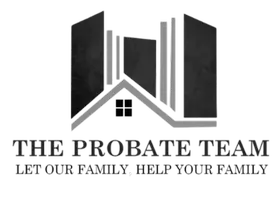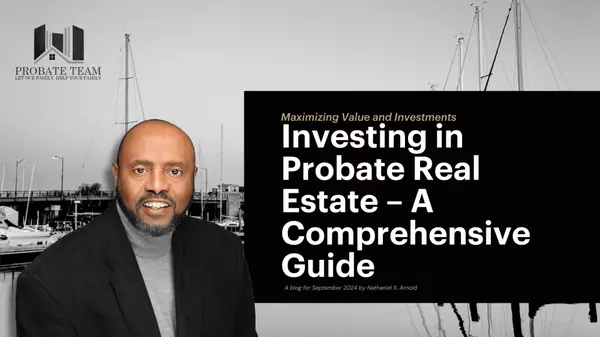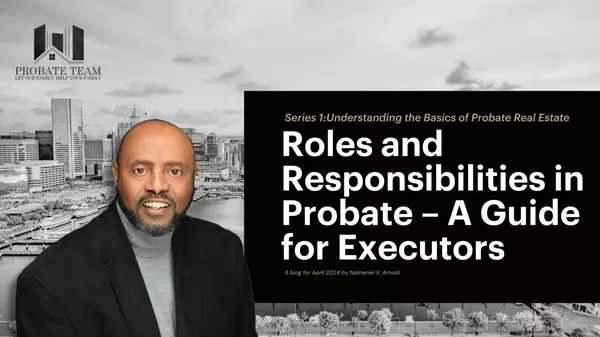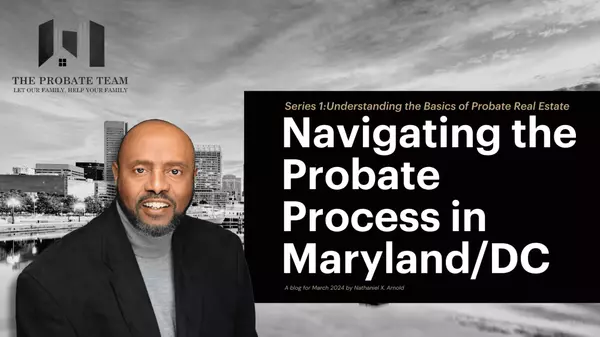Roles and Responsibilities in Probate – A Guide for Executors
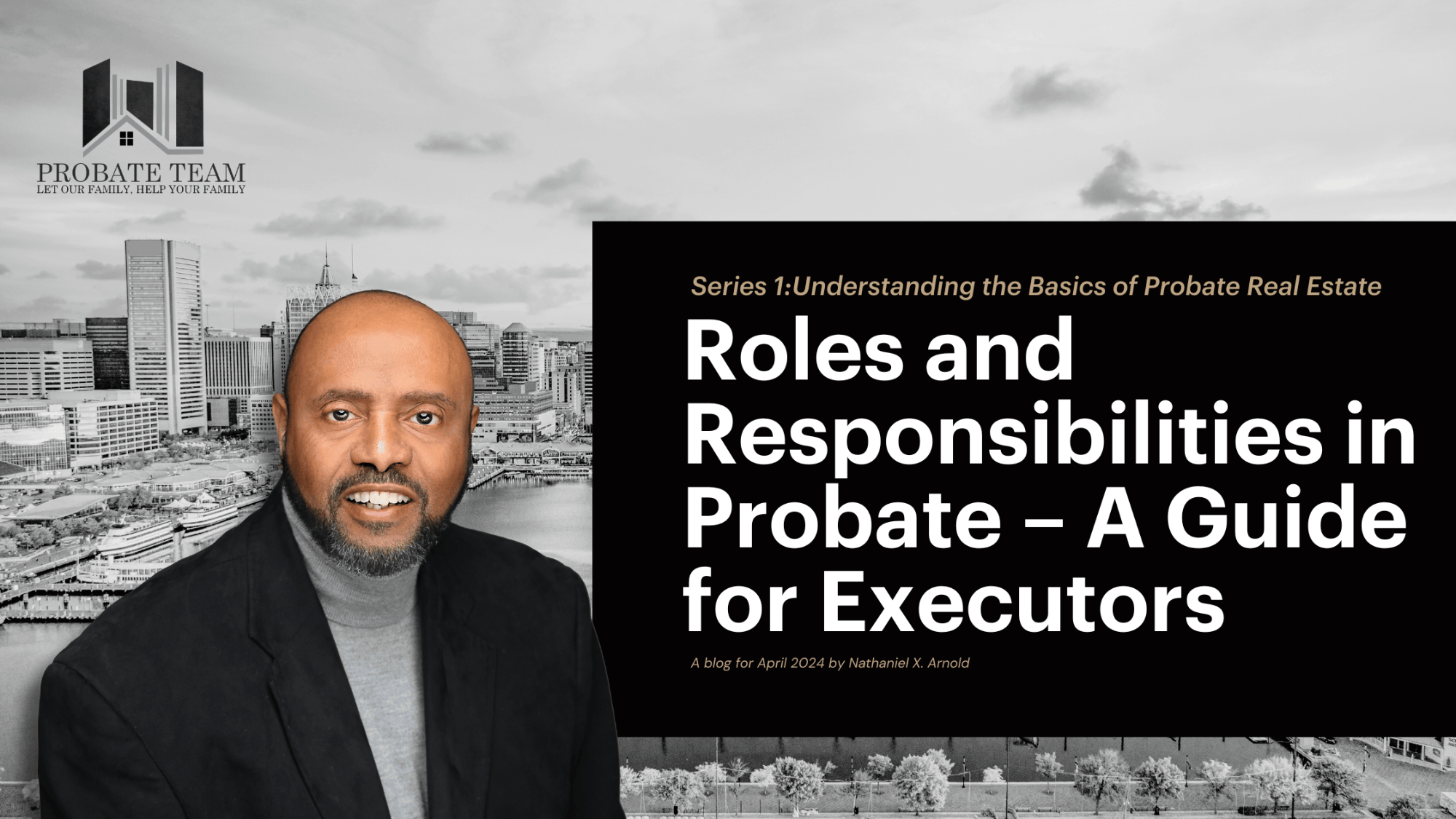
Roles and Responsibilities in Probate – A Guide for Executors
Understanding the Executor's Crucial Role
Hello again, and welcome to the second edition of our Probate Real Estate Blog Series! As your dedicated Probate Real Estate Broker in Maryland/DC, I'm here to shed light on the pivotal role of executors in the probate process. If you find yourself appointed as an executor or are contemplating taking on this responsibility, understanding your role is paramount.
The Executor's Mandate
When someone designates you as an executor in their will or the court appoints you, your primary responsibilities include:
- Locating and Managing Assets: One of the initial tasks is identifying and managing all assets of the deceased, which may include real estate, bank accounts, investments, and personal belongings.
- Probate Petition: Filing the probate petition initiates the legal proceedings. The court officially recognizes you as the executor, granting you the authority to act on behalf of the estate.
- Notification of Creditors: Executors must inform creditors of the deceased's passing, allowing them to file claims against the estate. Managing and settling these claims is part of the executor's role.
- Inventory and Appraisal: Creating an inventory of all assets and obtaining professional appraisals, especially for real estate, is crucial for determining the estate's overall value.
- Debt Settlement: Executors must use estate funds to settle outstanding debts and taxes. Real estate might need to be sold to generate the necessary funds.
- Distribution of Assets: Once debts are settled, the remaining assets are distributed to heirs or beneficiaries according to the deceased's wishes or state laws if there is no will.
Challenges Faced by Executors
While the role of an executor is vital, it comes with its own set of challenges:
- Legal Complexity: Navigating the legal complexities of probate, especially in Maryland/DC, can be overwhelming. Executors often seek legal guidance to ensure compliance with state laws.
- Communication with Heirs: Keeping heirs informed and managing potential conflicts requires effective communication skills. Executors need to maintain transparency to foster a smooth probate process.
- Property Management: Real estate management involves making decisions about whether to sell, maintain, or upgrade the property. Executors should consider the best interests of the estate and its beneficiaries.
- Financial Responsibilities: Executors are responsible for handling the estate's financial matters, which include paying bills, managing accounts, and ensuring the proper distribution of assets.
Tips for Effective Estate Administration
- Seek Professional Guidance:
Executors should consult with probate attorneys and financial advisors to navigate legal complexities and financial matters successfully.
- Open Communication:
Maintain open and transparent communication with heirs. Regular updates can help alleviate concerns and prevent potential conflicts.
- Document Everything:
Keep detailed records of all transactions, communications, and decisions made during the probate process. This documentation is crucial for legal and financial accountability.
- Consider Real Estate Professionals:
For real estate matters, engage with experienced probate real estate brokers. They can provide valuable insights into property valuation, market trends, and strategies for selling real estate efficiently.
Success Stories – Executors Making a Difference
In our line of work, we've witnessed numerous executors successfully navigate the probate process, ensuring a smooth and efficient transition for heirs. These success stories often share common threads:
- Proactive Decision-Making: Executors who take proactive steps in managing assets, addressing challenges, and communicating effectively tend to achieve positive outcomes.
- Collaboration with Professionals: Executors who collaborate with legal, financial, and real estate professionals leverage their expertise to streamline the probate process.
- Strategic Real Estate Decisions: Successful executors often make informed decisions regarding real estate, whether it's selling at the right time, renovating for increased value, or maintaining properties for optimal returns.
Conclusion – A Guiding Hand in the Probate Journey
Being appointed as an executor is a significant responsibility, and the path can be complex. However, with the right guidance and proactive decision-making, you can successfully fulfill your role and ensure a smooth probate process.
As your Probate Real Estate Broker in Maryland/DC, I'm here to offer support and expertise, especially when it comes to real estate matters. In our next blog, we'll shift our focus to Probate Real Estate Sales – an essential aspect of the probate process. Stay tuned for insights into the intricacies of selling real estate during probate, maximizing property value, and overcoming potential challenges.
Feel free to reach out with any questions or specific topics you'd like me to cover in future blogs. Together, let's make your probate journey a successful one!
As you embark on the journey of estate planning, don't hesitate to seek expert guidance. Leave your query and arrange a call back to consult freely with one of the Probate Investors Team's experienced experts. Alternatively, you can reach out directly by calling 301-485-5072. Your financial future deserves the attention and care that comes with professional advice. Take the first step towards securing your legacy today!
